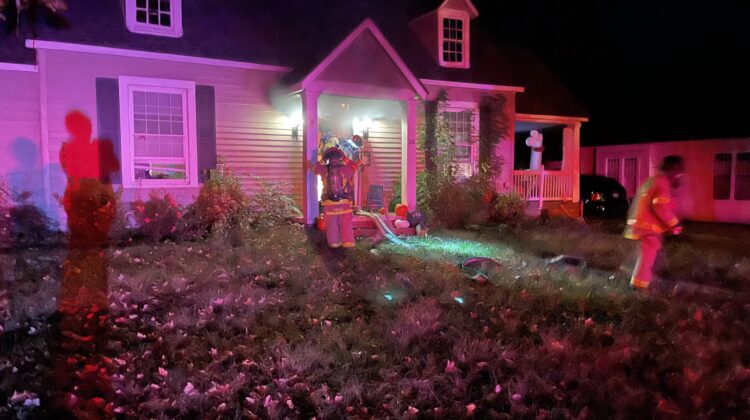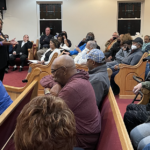

Should the City of Covington change the way in which its firefighters accrue time off?
It’s a discussion city leaders held during a meeting of the Finance & Administration Committee Tuesday afternoon.
“This came about when (city comptroller Tina) Dunn had some issues with some overages, with some liabilities on some sick time and I think that’s what kinda brought it to light,” said fire chief Richard Griggs. “She reached out to (the Municipal Technical Advisory Service) and they shed some light on some things that we may not be doing properly.”
Lasting for nearly an hour, the discussion centered around whether or not firefighters are earning leave in way that is equitable to all municipal employees.
They used to work 16-hour shifts and changed to 24-hour shifts six years ago. Compared to the eight-hour employees, they’re accruing time off at a rate of 10 percent to everyone else’s 4.6.
Firefighters can accrue enough time off that they receive a payout when they retire, which can be expensive.
“When the audit time came up we were looking at the numbers and if we continue to allow this way of accrual it’s not feasible,” Dunn said. “They’re getting three times the amount of vacation time and sick time as a 40-hour employee.”
Employees who work eight-hour shifts work 2,080 hours per year while those who work 24-hour shifts work 2,800. Firefighters work 9-11 days per month.
In Covington, employees who’ve been with the city for 30 years or more can earn up to 240 hours of annual leave. For firefighters, this equates to 720 hours, Dunn said.
When eight-hour employees use a day of leave, that totals eight hours while it’s 24 hours for firefighters.
“(A firefighter) has to burn more time,” said alderman Chris Richardson, a state trooper. “If he’s sick and has to burn a day, it’s going to take 24 hours where if anyone else takes a day it’s going to be eight hours.”
The amount of time allowed for each type of employee is the equivalent of 30 shifts for eight-hour employees and 30 shifts for 24-hour employees.
Those advocating for the change said there was no way to make things completely equal, but they wanted to make it more in line with the way leave is earned by others.
Though vacation time has a cap on it, sick leave does not and that’s where the issues lies.
“They don’t work three times more,” Dunn said. “Even with 24-hour shifts, they don’t work three times as much as the eight-hour employees. They only work 900 more hours than the eight-hour employees, they don’t work 2,000 more hours. Even though they burn 24 hours, they’re still accruing it at a rate three times the amount of eight-hour employees and it should not be three times as much to be equivalent.”
In other areas of Tipton County not as much time off is accrued and the percentages are more comparable, but public safety employees sometimes accrue leave at a slightly higher rate as an incentive.
Alderman Danny Wallace, whose sons are both longtime Covington firefighters, did his best to stay out of the discussion, only adding, “You’re comparing an apple to an orange. There are different circumstances, different levels of interacting. I can’t say anything else.”
“I can,” said alderman John Edwards. “I would like our public safety employees to be able to retire faster than a normal employee because of how much is invested into their jobs.”
Mayor Justin Hanson reminded Edwards employees can now retire after 30 years due to a change in the way the city handles its retirement plan.
MTAS Consultant Ronnie Neill, who is the Somerville mayor, said this issues comes up several times a year around the region.
“What is the problem?” asked vice mayor Johnetta Yarbrough. “They don’t just work eight hours …”
“But they only work 10 days,” Neill answered. “They are able to take off a tremendous amount of time for working 10 shifts a month. They can take off two-and-a-half shifts per month and you would have to presumable hire extra firefighters to make up for that time that everyone’s off.”
Mayor Justin Hanson said the point was not to take away what has already been earned but moving forward the accrual could change if the board decides to do so.
“The thing I struggle with is the police department works 12-hour shifts, the fire department 24, and everyone else eight hours. How can you rationally compare all of that and make it a percentage instead of ‘this is this, this is this, this is this’? That’s the problem I have with the concept of understanding why we’re trying to give them a percentage. When they have to take off for sick time it’s 24 hours.”
Hanson said the intentions are to review and ensure the most equitable options for the city are in place.
“It’s the classic example of the decisions you’ll have to make where there’s not a right or wrong answer,” Neill said. “What is fair and what can you afford?”
If passed, the change is expected to go into effect when fiscal year 2023 begins on July 1.
The board will discuss it again at February’s committee meeting on Tuesday, Feb. 15 at 4 p.m. The public can attend the meeting at City Hall or watch it live through the city’s Facebook page.






Leave a Reply